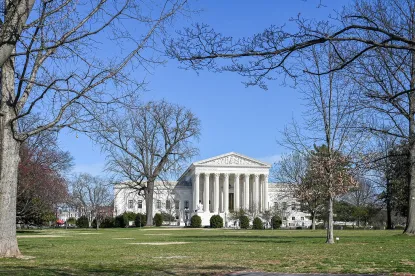Highlights
Supreme Court upholds Pennsylvania’s unique business registration statute
Post-Mallory, the dispute over the constitutionality of consent-by-registration will continue
Pennsylvania Fire, decided in 1917, has not been implicitly overruled by subsequent personal jurisdiction jurisprudence
The U.S. Supreme Court has issued its decision in the closely watched personal jurisdiction case Mallory v. Norfolk Southern Railway Co. The court’s judgment relied on the 1917 case Pennsylvania Fire Ins. Co. of Philadelphia v. Gold Issue Mining & Milling Co. – which, the court concluded, the 1945 case International Shoe v. Washington and its progeny did not implicitly overrule.
In a decision joined by five justices, the court held that under Pennsylvania Fire, the due process clause does not prohibit a state court from exercising personal jurisdiction over an out-of-state corporation when that corporation registered to do business in the state, consented to personal jurisdiction through that registration, and maintained significant business operations in the state.
Four justices disagreed, arguing that the court’s decision permits states to circumvent International Shoe’s due process clause limits on personal jurisdiction. And Justice Samuel Alito – who provided the crucial fifth vote for the court’s judgment – concurred to explain he agreed Pennsylvania Fire’s holding was binding and that given the facts, the result was not so unfair as to violate due process. He also noted “there is a good prospect” that an out-of-state plaintiff’s lawsuit against an out-of-state company on claims unlreated to the forum state violates the dormant commerce clause. Accordingly, even after Mallory, the dispute over the constitutionality of consent-by-registration will continue.
Mallory Case’s Background
Mallory began when Robert Mallory, who was employed by Norfolk Southern as a freight car mechanic in Ohio and Virginia, sued his employer in Pennsylvania state court in Philadelphia County over his alleged exposure to toxic chemicals on the job. Mallory asserted that the Pennsylvania court had personal jurisdiction over Norfolk Southern under Pennsylvania’s business registration statute. This statute requires every foreign business to register to do business in the commonwealth and, through registration, consent to Pennsylvania state courts exercising “general” personal jurisdiction over it (i.e., exercising personal jurisdiction even in cases that, as in Mallory, have no connection to Pennsylvania).
Relying on recent U.S. Supreme Court precedent, the trial court concluded there was no basis for general personal jurisdiction because Norfolk Southern was neither headquartered nor “at home” in Pennsylvania. Mallory appealed to the Pennsylvania Supreme Court, which affirmed the trial court and held that Pennsylvania’s consent-by-registration statute was unconstitutional to the extent it allowed Pennsylvania courts to exercise general jurisdiction over foreign corporations not “at home” in Pennsylvania.
The U.S. Supreme Court agreed to hear Mallory to determine whether the Fourteenth Amendment’s due process clause prohibits a state from requiring an out-of-state corporation to consent to personal jurisdiction to do business there. Mallory argued that the issue was settled more than a century ago in Pennsylvania Fire Ins. Co. of Philadelphia v. Gold Issue Mining & Milling Co. Norfolk Southern argued that such jurisdiction-by-consent was in conflict with the jurisprudence developed following International Shoe.
U.S. Supreme Court’s Mallory Decision
Five justices – Justice Neil Gorsuch, Justices Clarence Thomas, Samuel Alito, Sonia Sotomayor, and Ketanji Brown Jackson – sided with Mallory and concluded that Pennsylvania Fire controlled this case. Pennsylvania Fire arose from a lawsuit brought in Missouri state court against an insurance company incorporated in Pennsylvania on a contract that was formed in Colorado. The insurance company, like Norfolk Southern, objected based on the due process clause since it had no connection to Missouri.
However, the Supreme Court unanimously held there was “no doubt” the insurance company could be sued in Missouri by an out-of-state plaintiff on an out-of-state contract because it had agreed to accept service of process in Missouri as a condition of doing business there. In concluding that Mallory fell within the contours of Pennsylvania Fire, the court emphasized that Norfolk Southern “registered to do business in Pennsylvania, that it established an office there to receive service of process, and that in doing so it understood it would be amenable to suit on any claim.”
The court also rejected Norfolk Southern’s – and the Pennsylvania Supreme Court’s – position that International Shoe and its progeny implicitly overruled Pennsylvania Fire, explaining that because the court had not expressly overruled Pennsylvania Fire, the Pennsylvania Supreme Court “clearly erred” in not applying it.
The remainder of Justice Gorsuch’s opinion – joined by Justices Thomas, Sotomayor, and Jackson, but not Justice Alito – argued that Pennsylvania Fire and International Shoe “sit comfortably side by side.” They contended that International Shoe simply created an alternative– an “additional road” – to exercise jurisdiction over an out-of-state corporation and did nothing to displace other “traditional ones,” such as Pennsylvania Fire. They also rejected Norfolk Southern’s arguments that were premised on “fair play and substantial justice” and “fairness.” Attaching a Norfolk Southern infographic describing its “intrastate activities” in Pennsylvania, these justices highlighted that Norfolk Southern employs nearly 5,000 people in Pennsylvania and maintains more than 2,400 miles of track in the commonwealth.
In a brief concurring opinion, Justice Jackson added that Norfolk Southern’s challenge should also be rejected under Insurance Corp. of Ireland v. Compagnie des Bauxites de Guinee, which held that personal jurisdiction is waivable. She argued this implies that, as with other constitutional rights, states can ask defendants to waive personal jurisdiction rights, “even though the government could not have otherwise bypassed the rules and procedures those rights protect.”
Perhaps most importantly, Justice Alito’s concurring opinion explained that the majority’s opinion rested on the presumption that the Constitution allows a state to impose a consent-registration requirement – an assumption that Justice Alito was not convinced should be accepted. Relying on the circumstances of the case, and in particular Norfolk Southern’s “extensive operations in Pennsylvania,” he declined to overturn Pennsylvania Fire because subjecting Norfolk Southern to suit “is not so deeply unfair that it violates the railroad’s constitutional right to due process.”
Justice Alito raised concerns, however, about whether such consent-by-registration statutes are consistent with the “dormant” commerce clause. He argued there “is reason to believe that Pennsylvania’s registration-based jurisdiction law discriminates against out-of-state companies,” and contended that the law “imposes a ‘significant burden’ on interstate commerce” without advancing a legitimate local interest. Notably, though Norfolk Southern had raised this commerce clause argument in the Pennsylvania Supreme Court, that court had not addressed it, and Justice Alito urged the Pennsylvania Supreme Court to consider the issue on remand.
Justice Amy Coney Barrett authored a dissent joined by Chief Justice John Roberts and Justices Brett Kavanaugh and Elena Kagan. These justices disagreed that International Shoe simply added another route to establishing jurisdiction, explaining that it was “the Court’s transformative decision on personal jurisdiction” and the Supreme Court itself has reminded litigants not to rely heavily on pre-International Shoe decisions such as Philadelphia Fire. The dissent also emphasized that “Pennsylvania is the only State with a statute treating registration as sufficient for general jurisdiction,” which suggests the court’s decision will have limited application outside of Pennsylvania courts.
Key Takeaways
In sum, Mallory raises more questions than it answers. It holds that the Pennsylvania can require out-of-state corporations registering to do business there to consent to general personal jurisdiction – at least if the corporation, like Norfolk Southern, has extensive operations in Pennsylvania. It therefore remains uncertain whether a corporation that merely registers to do business in Pennsylvania and has insignificant business there may be subject to general jurisdiction in Pennsylvania courts. Additionally, Justice Alito’s comments on the dormant commerce clause issues raised by consent-by-registration statutes will likely be the subject of further litigation.






 />i
/>i

